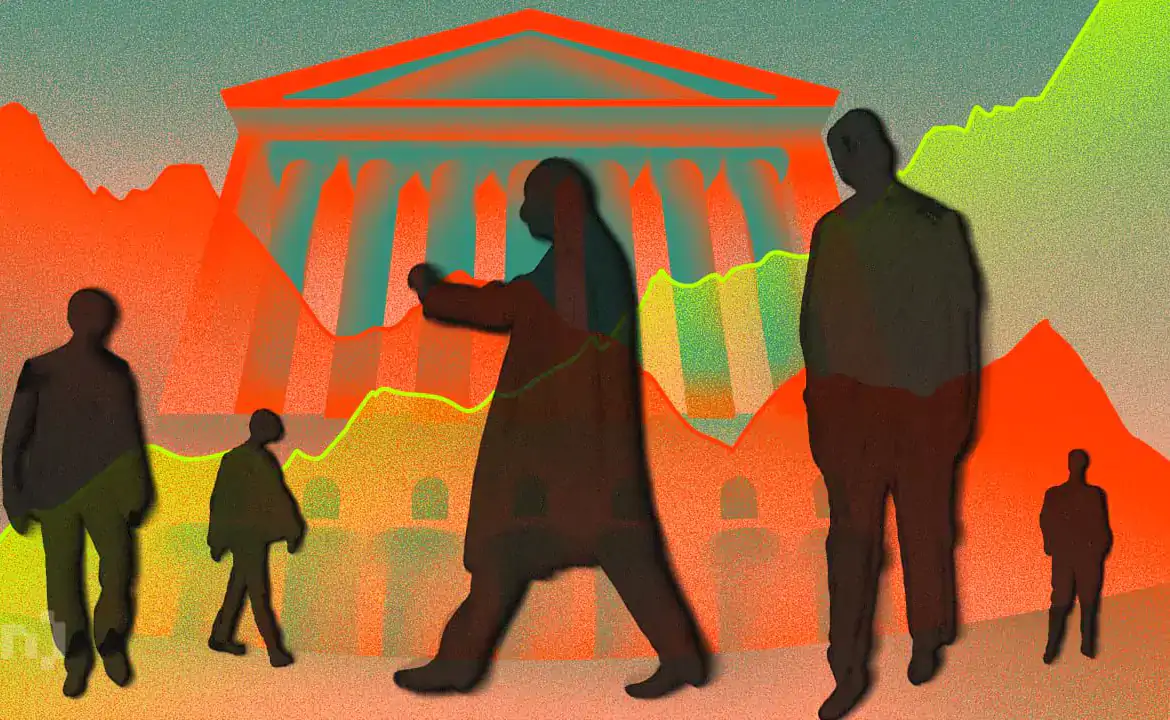In December 2020, the SEC sued Ripple Labs for issuing and selling unlicensed securities to the public. The Ripple vs SEC lawsuit is still unfolding, and its findings will stand as guidelines for the cryptocurrency industry’s future.
But before we dig into the Ripple vs SEC update, let’s clarify how the SEC decided to sue Ripple.
In 2011, Ripple Labs launched alongside , the cryptocurrency. XRP consists of a supply of 100 billion coins, created from the start, unlike bitcoin or ethereum, which required mining. Jed McCaleb, a crypto pioneer, together with a group of programmers, and Chris Larsen, a wealthy entrepreneur, founded the company.
In this guide:
Ripple vs SEC: A recap of the lawsuit
In the beginning, Ripple had a hard time using its top-notch blockchain and cryptocurrency for a real purpose. XRP is the cryptocurrency issued by Ripple. Anyone can check the blockchain to see who owns what, but no coin needs to be mined. This made it a target for speculators who started to bid up its value.
Since 2015, Ripple has tried to convince banks to use XRP as a means to transfer funds overseas. In 2016, Ripple hired former Yahoo COO, Brad Garlinghouse, to help them find a killer use case for XRP. And he did.
Garlinghouse started pitching XRP as a bridge currency for global money transfers to financial institutions and banks. When used for international transfers, banks wouldn’t need to hold reserves of minor currencies that would block the bank’s funds.
Furthermore, the banks would need to hold that particular currency only momentarily, simultaneously increasing XRP’s liquidity and price.
Ripple had partnerships with MoneyGramSantander and it was soon one of the big players among the financial institutions. This also raised the price of XRP from less than $0.01 to over $3 in January 2018.
this is where the SEC (the U.S. Securities and Exchange Commission) comes in. The governmental agency said thatRipple released $1.3 billion worth of unlicensed securities to the public. Moreover, it names Larsen and Garlinghouse as defendants, the top names of the Ripple team.
Stephanie Avakian, Director of the SEC’s Enforcement Division, stated that,
“We allege that Ripple, Larsen, and Garlinghouse failed to register their ongoing offer and sale of billions of XRP to retail investors, which deprived potential purchasers of adequate disclosures about XRP and Ripple’s business and other important long-standing protections that are fundamental to our robust public market system,”
The Ripple vs SEC lawsuit caused XRP’s price to drop dramatically from 58 cents to 21 cents in December 2020. However, it did rebound later in 2021.
What is a financial security?
security” does not have a utility and is a tradable financial asset representing some form of ownership in a corporation or a similar entity. For instance, publicly traded companies represent shares as “securities,” often to raise capital.
There are three types of securities: equity, debt and hybrids. Together with public sales, securities are regulated by the SEC.
Companies, partnerships, or trusts issuing equity securities give the owner an ownership interest in the assets of that entity.
A debt security is a financial instrument that represents money that has been borrowed. The terms specify the loan amount, annual percentage rate, maturity period (when it must be repaid), and other conditions.
What makes a “security” for the SEC?
What is a “security” for the SEC is somehow unclear, given the fact that in 2019, the agency publicly stated that bitcoin is not a security, arguing that the SEC,
“…[they] do not believe that current purchasers of bitcoin are relying on the essential managerial and entrepreneurial efforts of others to produce a profit.”
In determining whether a token is legally a security, the SEC uses the Howey Test.
What is the Howey test?
The U.S. SEC vs Howey was a Supreme Court case in 1946 that has a pivotal role in securities-related cases. It helps determine if a transaction is an investment contract as stated in the Securities Act of 1933.
What was the Howey case about?
In 1946, two individuals from Florida were sold parts of their citrus grove land. They offered the option to lease the land back to the sellers. They would serve the land, harvest, and market the products and share part of the profit with the landowners.
However, the U.S. Securities and Exchange Commission (SEC) sued them for not filing a securities registration statement.
The Supreme Court ruled that the contract was an investment contract and it set the following guidelines to be used for future cases:
- There is an investment of money
- The investment needs to be in a company or project (A common enterprise where the investors pool in their money and assets to invest in a project.)
- Profit is expected
The profits come from the efforts of the promoter or third party. Although the Howey test uses the term “money,” it is used for other kinds of investments and assets.
A key point in declaring an investment contract a “security” is the control of the investor over the profit. If the investors have no control over that asset, it is usually deemed to be a security. For a cryptocurrency to be classified as a security, it needs to meet all the criteria mentioned in Howey’s test.
So what was the result in the case of Ripple?
How does the Howey Test apply to Ripple?
The Howey Test admittedly has vague guidelines. The SEC concluded that XRP complies with the requirements of the Howey test
- Ripple Labs, the company, sold $1.38 billion worth of XRP tokens.
- Investors bought XRP because they believed they were investing in a common enterprise.
- Ripple’s marketing promotion and supply manipulation made investors believe that XRP’s price would rise due to the company’s efforts.
Ripple vs SEC lawsuit: A detailed timeline of events
Ripple gained attention after their access to the U.S. banking system through partnerships with financial institutions in 2014.
December 21, 2020
The SEC initiated the lawsuit against Ripple Labs, CEO Brad Garlinghouse, and co-founder Chris Larsen.
Allegedly, Ripple Labs is selling unregistered securities, instead of a commodity, in a centralized environment. The SEC is accusing the two Ripple Labs execs of selling over 14.6 billion XRP tokens as means to fund the company and get rich.
Ripple Labs CEO, Brad Garlinghouse announced that they will defend themselves in court.
December 28, 2020
Coinbase, the largest cryptocurrency exchange, announced the delisting of the XRP token. Full suspension was planned to take place on January 19, 2021, at 10 a.m. Pacific Standard Time.
March 3, 2021
Ripple Labs execs, Garlinghouse and Larsen, sent letters to the U.S. District Court Southern District of New York Magistrate in pursuit to get Judge Sarah Netburn to dismiss the lawsuit Ripple vs SEC. They argue the lack of “fair notice and due process.”
March 8, 2021
SEC responds by sending a letter to the judge to strike “fair notice” defence, seeking a hearing immediately.
March 22, 2021
Judge Netburn told the SEC her understanding of XRP is: “… not only does it have a currency value but it has a utility, and that utility distinguishes it from bitcoin and ether
April 13, 2021
SEC Commissioner Hester M. Peirce published the Token Safe Harbor Proposal 2.0The updated proposal seeks to provide a three-year grace period for developers to find a way to simplify participation in a decentralized network, in which they would be exempted from the securities law.
June 14, 2021
The court granted the SEC’s motion to delay the disclosure of SEC’s internal communications about bitcoin, ethereum and XRP until August 31.
Internal documents on other cryptos may shed some light on the general view of the SEC on crypto. The court has yet to rule if they want the SEC to disclose their internal trading policies around crypto.
August 31, 2021
The deadline for disclosing the SEC’s internal documents. The fact discovery must take place by this date.
October 15, 2021
Expert discovery deadline for collection of what experts in the field of crypto and securities have to say on the matter.
What does the lawsuit mean for the crypto community?
The entire cryptocurrency industry is watching the Ripple vs SEC lawsuit, as its output will establish a precedent. The findings of the lawsuit will also help clarify the regulatory landscape for future ICOs.
Ripple vs SEC: Where does the crypto community stand?
There is more to blockchain technology than bitcoin and cryptocurrency exchanges. Crypto is about disrupting outdated financial institutions and systems we have in place today, which are mostly slow and inefficient. Those that struggle to accumulate wealth now have a glimmer of hope that the system can change in their favor.
It’s not just the Ripple community that’s concerned with the findings of the Ripple vs SEC lawsuit. The case can set a strong message for all involved in the crypto industry, besides XRP holders. The lawsuit’s outcome could mean different results depending on the country. However, the U.S. would have its special status for crypto.
The crypto community is mostly positive about the Ripple vs SEC lawsuit, with most seeing the odds favoring Ripple Labs. The main concern of existing XRP holders is what might happen to the price of XRP



 BlocksInform
BlocksInform











